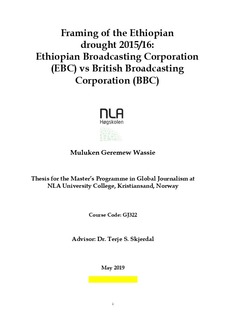| dc.description.abstract | This study is intended to analyse how the Ethiopian Broadcasting Corporation (EBC), representing the national media, and the British Broadcasting Corporation (BBC), representing the international media, framed the 2015/16 Ethiopian drought. What types of frames, sources, themes and tone were used by the two media are studied by using an adapted version of previously used framing typologies in climate change and drought studies. The framing of drought and the process through which the EBC journalists went through in reporting the 2015/16 drought are also studied using qualitative in-depth interviews. The findings reveal that EBC and BBC used significantly different types of frames, sources, themes and tone in framing the drought. EBC is found to focus more on solution-oriented stories, which deal with how different actors addressed the drought problem (prognostic frame); and on the rationale for engaging in action to avert the drought (motivational frame). EBC rarely reported stories that are related to the impact of the drought on the environment, health, food supply and agricultural products (symptomatic frame) and the effect of countermeasure activities (after-effect frame); and hardly any of the news story presented the feeling of drought victims (empathy frame). BBC, on the other hand, focused more on revealing the feelings and emotions of drought victims (empathy frame) and the impact of the drought (symptomatic frame). Prognostic frames are rather rare at BBC. While EBC is found to rely dominantly on government sources, BBC is found to concentrate more on the drought victims. Also, while EBC mainly focuses on themes related to the activities and policies of the Ethiopian government, BBC amplifies the magnitude of the drought in terms of affecting the environment and people. The drought is also found to be reported by the two media with different tones - EBC highlighting the impression of improving drought problems and BBC accentuating negative impression to the situation of the drought. The in-depth interviews reveal that drought reporting is systematically manipulated in a way that EBC journalists are guided to frame drought as a normal and natural phenomenon. Thus, the journalists seem to lack the courage to report drought if it transforms into hunger and starvation causing complicated health problems and loss of human life. They seem to do so in order to preserve the public morale, national image and government legitimacy. | nb_NO |
